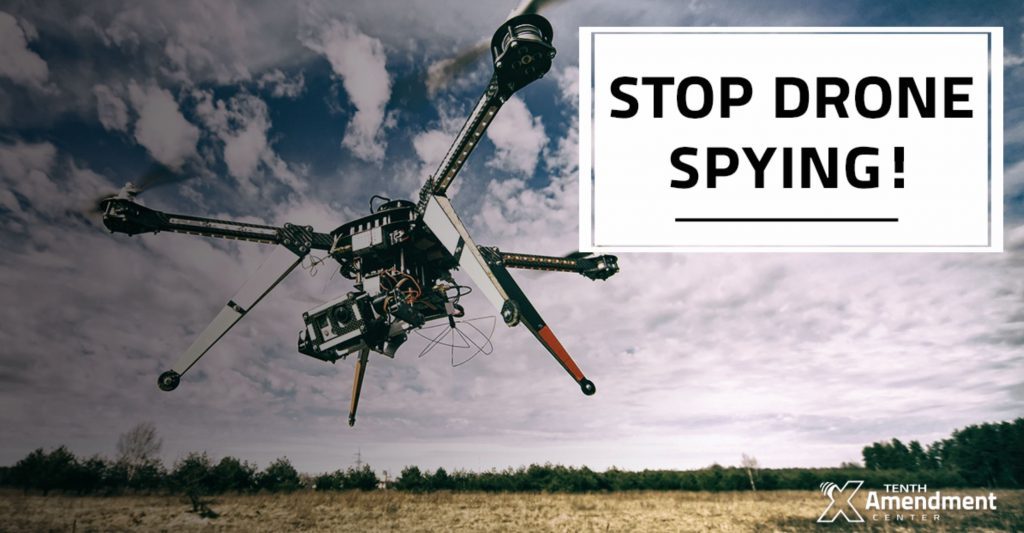Yesterday, a Kentucky Senate Committee passed a bill that would require police to get a warrant before engaging in drone surveillance in most situations. Final passage of this legislation would not only establish important privacy protections at the state level, it would also help thwart the federal surveillance state.
Rep. Diane St. Onge (R-Lakeside Park) and Rep. Reginald Meeks (D-Louisville) introduced House Bill 22 (HB22) on Jan. 2. The legislation would prohibit the use of a drone for a “search” unless authorized under the Fourth Amendment to the United States Constitution and Section 10 of the Kentucky Constitution. This would require police to get a warrant before conducting drone surveillance in most situations. In order for the search to be valid, the warrant would have to specifically authorize the use of an unmanned aircraft system.
The proposed law would require police to minimize data collection on non-suspects and would prohibit the disclosure of any such data without a court order.
Any information collected in violation of the law would be inadmissible as evidence in any civil, criminal, or administrative proceeding in the state.
HB22 would also prohibit the operation of any drone equipped with a lethal payload.
On Thursday, the Senate Judiciary Committee reported HB22 favorably with an amendment. The amended language provides some liability exemptions for certain contractors and emergency responders using drones for non-surveillance purposes.
The House previously passed HB22 by a 94-0 vote.
A similar bill passed the Kentucky House during the 2017 session, but never made it to the Senate floor for a vote.
Impact on the Federal Surveillance State
Although the proposed law would only apply to state and local drone use, it throws a high hurdle in front of some federal programs.
According to a report by the Electronic Frontier Foundation, drones can be equipped with various types of surveillance equipment that can collect high definition video and still images day and night. Drones can be equipped with technology allowing them to intercept cell phone calls, determine GPS locations, and gather license plate information. Drones can be used to determine whether individuals are carrying guns. Synthetic-aperture radar can identify changes in the landscape, such as footprints and tire tracks. Some drones are even equipped with facial recognition. According to research from the Center for the Study of the Drone at Bard College, 347 U.S. police, sheriff, fire, and emergency response units acquired drones between 2009 and early 2017—primarily sheriff’s offices and local police departments.
Much of the funding for drones at the state and local level comes from the federal government, in and of itself a constitutional violation. In return, federal agencies tap into the information gathered by state and local law enforcement through fusion centers and a federal program known as the information sharing environment.
According to its website, the ISE “provides analysts, operators, and investigators with information needed to enhance national security. These analysts, operators, and investigators… have mission needs to collaborate and share information with each other and with private sector partners and our foreign allies.” In other words, ISE serves as a conduit for the sharing of information gathered without a warrant.
The federal government encourages and funds a network of drones at the state and local level across the U.S., thereby gaining access to a massive data pool on Americans without having to expend the resources to collect the information itself. By placing restrictions on drone use, state and local governments limit the data available that the feds can access.
Currently, 18 states—Alaska, Florida, Idaho, Illinois, Indiana, Iowa, Maine, Montana, Nevada, North Carolina, North Dakota, Oregon, Tennessee, Texas, Utah, Vermont, Virginia, and Wisconsin—require law enforcement agencies in certain circumstances to obtain a search warrant to use drones for surveillance or to conduct a search.
In a nutshell, without state and local cooperation, the feds have a much more difficult time gathering information. This represents a major blow to the surveillance state and a win for privacy.
WHAT’S NEXT
HB22 will now move to the Senate floor for debate and a vote.


Let’s be honest, does anybody truly believe this will have any effect on limiting the illegal acts of the Leviathan? The feds ignore the Constitution 99% the time, and essentially act as if the 10th Amendment doesn’t exist. I suppose on the state level it will stop cooperation but the feds will do what the feds want. Whenever they want.
Absotively. Plus, anyone in government that uses the words “national security” can do what ever it is that they please. It is right in the Constitution itself and was put there purposefully. National security to these cretins means keeping or expanding personal wealth and power by any means possible, or doing what ever demented actions that pleases them. I am in agreement with you Joel W.
I like the use of the language ‘exemption liabilities for certain contractors and emergency responders’. Funny. Hit men are contractors, private ‘security forces’ are contractors, private prison personnel or contractors, weapons, security, surveillance tech, equipment, personnel are contractors, how many ex Intelligence & Justice individuals are under ‘contract’ as private citizens? Hell, local PD can just hire an ex member who is a PI to ‘contract’. Activistpost.com has written a few articles now on different states making it harder for the fed to do mass data collection and surveillance, whether it’s drones, Stingrays, or other; this arouses my suspicions. Have they already moved on from that technology into something better? RDIF, IoT, nano-tech, satellites/mini-satellites, every electronic device equipped with RF-LEF(radar), microphones, cameras, and what-not? Shoot, even your gel pens could be broadcasting the movements of the pen and the algorythms reading this and ‘knowing’ what it is you are writing. Same as the tech Microsoft/Apple uses to know what you are typing. :D, fun times it is that we live in.